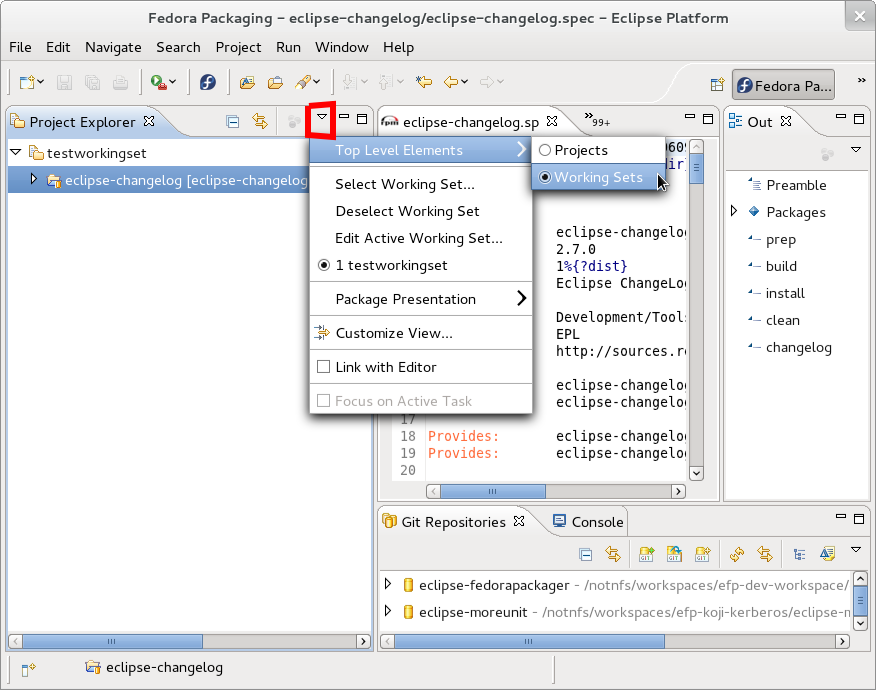From Fedora Project Wiki
No edit summary |
No edit summary |
||
| Line 15: | Line 15: | ||
# Anonymous clone: Repeat steps 2-5 but select "Clone Anonymously" and enter {{package|eclipse-rpm-editor}} as package name. | # Anonymous clone: Repeat steps 2-5 but select "Clone Anonymously" and enter {{package|eclipse-rpm-editor}} as package name. | ||
# Non-existing package: Repeat steps 2-5 but select "Clone Anonymously" and enter {{package|eclipse-123456}} as package name. This should result with an error message indicating that package {{package|eclipse-123456}} does not exist. | # Non-existing package: Repeat steps 2-5 but select "Clone Anonymously" and enter {{package|eclipse-123456}} as package name. This should result with an error message indicating that package {{package|eclipse-123456}} does not exist. | ||
# Add package to working set: Repeat steps 2-5, use package {{package|eclipse-changelog}} and select "Add project to working set". | # Add package to working set: Repeat steps 2-5, use package {{package|eclipse-changelog}} and select "Add project to working set". Create a new one, call it {{command|testworkingset}} | ||
|results= | |results= | ||
# Cloning should succeed without errors which weren't expected. I.e. it is expected that errors occur if SSH is not properly configured in Eclipse. Same if the Git repository does not exist for the entered package. | # Cloning should succeed without errors which weren't expected. I.e. it is expected that errors occur if SSH is not properly configured in Eclipse. Same if the Git repository does not exist for the entered package. | ||
# For the test in step 10 above verify results as follows: In the "Project Explorer" view select the triangular shape as illustrated in the following screenshot. Choose working sets as the top-level-element. [[Image:SelectWorkingSetTopLevel.png]] Then click the triangular icon again and make sure that {{command|testworkingset}} is selected. After that make sure that project {{command|eclipse-changelog}} shows up as part of that working set. All other projects in your current workspace should be hidden. | # For the test in step 10 above verify results as follows: In the "Project Explorer" view select the triangular shape as illustrated in the following screenshot. Choose working sets as the top-level-element. [[Image:SelectWorkingSetTopLevel.png]] Then click the triangular icon again and make sure that {{command|testworkingset}} is selected. After that make sure that project {{command|eclipse-changelog}} shows up as part of that working set. All other projects in your current workspace should be hidden. | ||
}} | }} | ||
Revision as of 17:23, 7 September 2011
Description
This test case tests whether cloning packages from Fedora Git works as expected. In particular, it tests if authenticated, anonymous cloning works as well as projects are added to working sets.
Setup
- Boot into the machine/VM you wish to test
- Ensure the
 eclipse-fedorapackager-0.2.1-1.fc16
eclipse-fedorapackager-0.2.1-1.fc16yum install eclipse-fedorapackager-0.2.1-1.fc16. - Make sure that file
~/.fedora.certexists and your FAS SSH key is properly set up in Eclipse and the public key properly uploaded to the FAS account system.
How to test
- Open Eclipse and use a new workspace.
eclipse -data test_day_20111013_fpe_cloning - Press
CTRL+ALT+F Ito open the import wizard. Alternatively pressCTRL+3and start typing "Projects from Fedora Git", then press return. - If you've never used Eclipse for SSH based cloning you will likely not have SSH preferences set up. This might cause some clone failures, but should give you appropriate error messages with proposed fixes. Should you run into this problem, detailed instructions are here. Feedback is very welcome if error messages are not what you would expect. In fact, this is one test case we'd like to have tested.
- Enter the package name
 eclipse-fedorapackager
eclipse-fedorapackager~/.fedora.certhas been found and should use the username extracted from it for the SSH based clone. Click "Finish". This will only work if you are a sponsored packager. If you are not sponsored, proceed with anonymous clone tests. - Fedora Packager for Eclipse should then ask if you'd like to switch to the "Fedora Packaging" perspective. Choose "Yes".
- A project with name
eclipse-fedorapackagershould now be available in your Eclipse workspace. - The perspective should open and you should see local branches "f13"-"f16" in the "Git Repositories View"
- Anonymous clone: Repeat steps 2-5 but select "Clone Anonymously" and enter
 eclipse-rpm-editor
eclipse-rpm-editor - Non-existing package: Repeat steps 2-5 but select "Clone Anonymously" and enter
 eclipse-123456
eclipse-123456 eclipse-123456
eclipse-123456 - Add package to working set: Repeat steps 2-5, use package
 eclipse-changelog
eclipse-changelogtestworkingset
Expected Results
- Cloning should succeed without errors which weren't expected. I.e. it is expected that errors occur if SSH is not properly configured in Eclipse. Same if the Git repository does not exist for the entered package.
- For the test in step 10 above verify results as follows: In the "Project Explorer" view select the triangular shape as illustrated in the following screenshot. Choose working sets as the top-level-element.
 Then click the triangular icon again and make sure that
Then click the triangular icon again and make sure that testworkingsetis selected. After that make sure that projecteclipse-changelogshows up as part of that working set. All other projects in your current workspace should be hidden.
